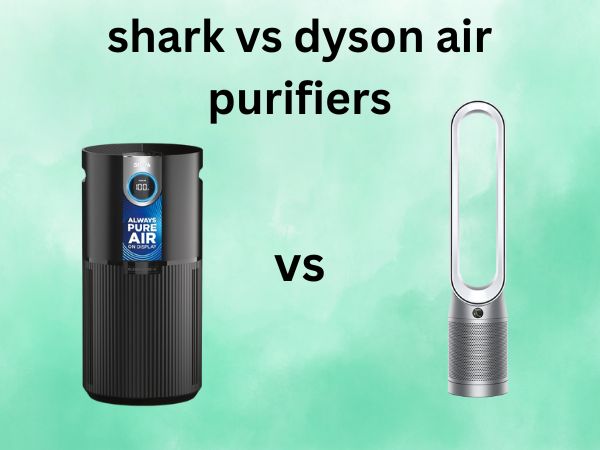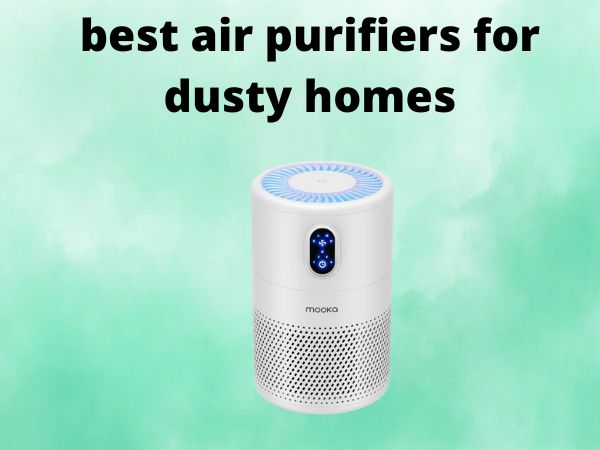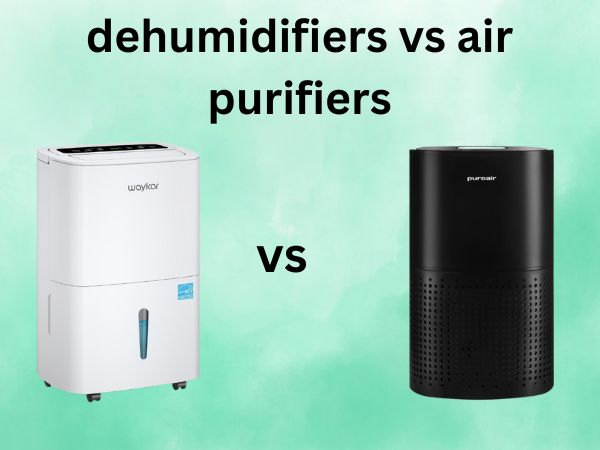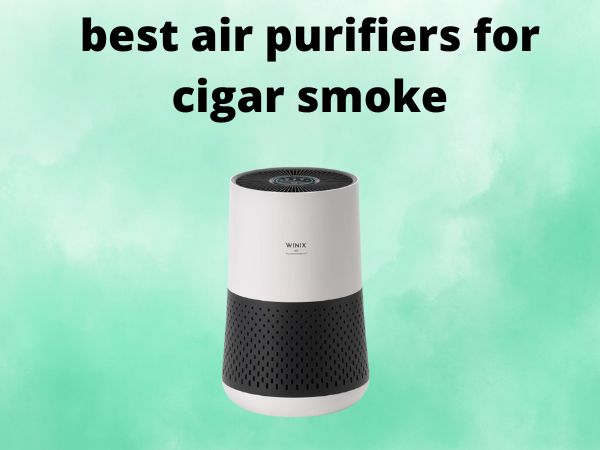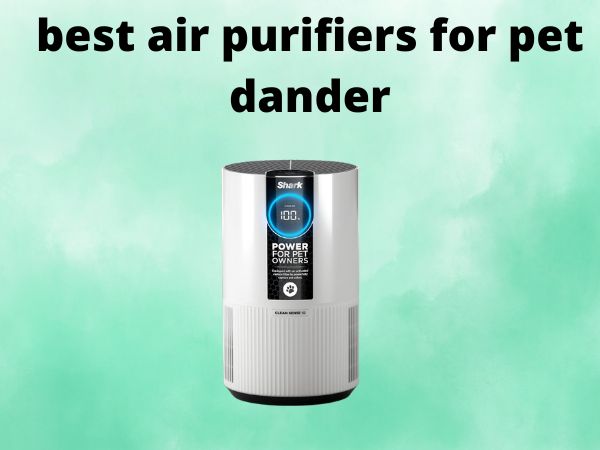Shark vs Dyson Air Purifiers [The Ultimate Comparison Guide]
Are you struggling to decide between a Shark and Dyson air purifier? You’re not alone. Both brands have earned strong reputations in the home appliance market, but they approach air purification quite differently. In this comprehensive comparison, I’ll break down everything you need to know to make an informed decision that fits your specific needs and budget.
Table of Contents
Introduction to Air Purification Technology
Before diving into the brand-specific details, let’s talk about why air purifiers have become essential home appliances in recent years. Indoor air can be surprisingly polluted—often containing allergens, dust, pet dander, volatile organic compounds (VOCs), and even microscopic pathogens. A quality air purifier addresses these concerns, helping you breathe easier and potentially reducing health issues related to poor air quality.
Why Air Purifiers Matter for Home Health
Did you know that according to the EPA, indoor air can be two to five times more polluted than outdoor air? This statistic becomes even more concerning when you consider that most Americans spend about 90% of their time indoors. Air purifiers work continuously to remove these contaminants, providing numerous benefits:
- Reducing allergy and asthma symptoms
- Eliminating pet odors and dander
- Capturing airborne dust before it settles on surfaces
- Filtering out smoke particles and VOCs
- Reducing the spread of airborne bacteria and viruses
With air quality concerns growing, it’s no wonder that brands like Shark and Dyson have invested heavily in developing efficient purification systems.
Brief Overview of Shark and Dyson as Brands
Before comparing their air purifiers specifically, let’s understand the companies behind the products.
Shark, owned by SharkNinja Operating LLC, has built its reputation on providing high-performance home appliances at more accessible price points. The company began with vacuum cleaners but has expanded into various home appliance categories, including air purifiers. Their approach typically focuses on practical innovation and competitive pricing.
Dyson, founded by James Dyson, established itself as a premium brand by revolutionizing vacuum technology with cyclonic separation. The company prides itself on cutting-edge design, significant R&D investment, and pioneering new technologies. Their products often feature distinctive aesthetics coupled with innovative functionality—but typically come with a premium price tag.
Key Technologies Behind Shark Air Purifiers
Shark has developed several proprietary technologies for their air purifiers, positioning them as affordable alternatives that don’t compromise on essential features.
Shark’s Filtration Systems Explained
Most Shark air purifiers utilize a multi-stage filtration system:
- Pre-filter layer: Captures larger particles like hair and dust, protecting the more sensitive HEPA filter from quick clogging
- True HEPA filter: Removes 99.97% of particles as small as 0.3 microns, including allergens, pollen, and mold spores
- Activated carbon filter: Absorbs odors, smoke, and VOCs
What sets Shark apart is their Clean Sense IQ technology, which automatically detects air quality in real-time and adjusts the purification strength accordingly. This smart sensing capability helps maintain optimal air quality while conserving energy when full power isn’t needed.
Another notable feature in some models is Shark’s Anti-Allergen Complete Seal, which ensures that all air passes through the filtration system without leakage—addressing a common weakness in lower-quality purifiers where air can bypass filters.
Notable Shark Air Purifier Models
Shark offers several air purifier models catering to different room sizes and needs:
- Shark Air Purifier 4: Designed for rooms up to 1,000 sq ft, featuring Clean Sense IQ technology
- Shark HE601: A premium option with six fans and multi-angle airflow for larger spaces
- Shark HP102: More compact and budget-friendly, ideal for bedrooms and smaller spaces
Each model maintains Shark’s core promise: effective purification without breaking the bank. The company typically includes washable pre-filters in their designs, helping reduce ongoing maintenance costs.
Dyson’s Air Purification Approach
Dyson takes a distinctly different approach to air purification, combining it with other functionalities and emphasizing design and technology innovation.
Dyson’s Signature Technology Features
Dyson’s most distinctive technology is their Air Multiplier™ technology, which creates a powerful airflow without visible blades. This allows their purifiers to double as fans in warm weather and even as space heaters in some models.
Key technologies in Dyson air purifiers include:
- 360° glass HEPA filter: Captures 99.97% of particles as small as 0.3 microns
- Activated carbon layer: Removes gases, odors, and VOCs
- Air Multiplier™ technology: Amplifies airflow while enabling bladeless design
- Dyson Core Flow™ technology: Creates precise airflow control
Many Dyson models also incorporate their proprietary sensing technology that continuously monitors air quality and displays it on an LCD screen or through their app. Some models can detect and report specific pollutants like NO2 from vehicle emissions and VOCs from household products.
Popular Dyson Air Purifier Models
Dyson’s product line includes several notable models:
- Dyson Purifier Cool™: Their iconic bladeless fan/purifier combination
- Dyson Purifier Hot+Cool™: Adds heating functionality for year-round use
- Dyson Purifier Humidify+Cool Formaldehyde: Their most advanced model, adding humidification and formaldehyde removal
Each model maintains Dyson’s premium aesthetics and multi-functionality approach, though at significantly higher price points than most Shark offerings.
Head-to-Head Comparison: Shark vs Dyson
Now that we understand each brand’s approach, let’s compare them directly across several key factors.
Filtration Efficiency and CADR Ratings
When it comes to pure filtration efficiency, both brands perform admirably, with each using True HEPA filters that capture 99.97% of particles as small as 0.3 microns. However, there are some differences worth noting:
Shark tends to focus on Clean Air Delivery Rate (CADR) as a key performance metric. CADR measures how quickly a purifier can filter specific contaminants in a given space. Many Shark models boast impressive CADR ratings, making them effective for quickly cleaning air in larger rooms.
Dyson, surprisingly, often has lower CADR ratings than similarly priced competitors. They argue that CADR doesn’t tell the whole story about purification effectiveness, especially when considering their whole-room circulation design. Independent testing suggests that while Dyson purifiers are effective, they sometimes take longer to clean a room completely compared to high-CADR alternatives.
In practical terms: If you need rapid air cleaning (like for allergies or immediate odor removal), Shark’s high CADR models might provide faster relief. For continuous, whole-room purification, either brand performs well.
Design and Aesthetics
This category shows perhaps the starkest contrast between the brands:
Dyson air purifiers are arguably pieces of modern art. With their bladeless loop designs, sleek finishes, and minimalist interfaces, they’re designed to be conversation pieces rather than appliances that blend into the background. Their distinctive appearance has become part of their brand identity, and they’re often purchased partly for their visual appeal.
Shark takes a more conventional approach with designs that, while not unattractive, prioritize function over form. Their purifiers typically have a more traditional tower or box shape with visible control panels. They’re designed to be effective appliances rather than design statements.
Your preference here depends entirely on your priorities: If you want your air purifier to enhance your decor, Dyson holds the advantage. If you’re more concerned with performance-per-dollar and don’t mind a more utilitarian appearance, Shark offers excellent value.
Noise Levels During Operation
Air purifier noise can significantly impact user satisfaction, especially for bedroom use or quiet environments.
Shark air purifiers typically operate between 30-65 decibels, depending on the fan speed. Their higher-end models incorporate noise reduction technology, but on maximum settings, they can be noticeable in quiet rooms. That said, most users find the lower settings perfectly acceptable for nighttime use.
Dyson units generally produce similar noise levels (30-62 decibels) but have a distinct advantage in how they distribute sound. The Air Multiplier technology creates a smoother airflow that many users find less disruptive than conventional fans. Their Night Mode specifically optimizes for quiet operation while maintaining effective filtration.
Sleep Mode Performance
Both brands offer sleep or night modes that reduce noise while maintaining purification.
Shark’s Night Mode typically drops the fan speed to its lowest setting and dims or turns off display lights. The resulting noise level (around 30-35 decibels) is comparable to a whisper.
Dyson’s Night Mode is slightly more sophisticated, monitoring air quality while operating at its quietest settings and dimming the display. Some models even adjust the airflow angle to be less direct during night hours.
For light sleepers, Dyson’s Night Mode might offer slight advantages, though both brands provide suitable quiet operation.
Smart Features and Connectivity
Modern air purifiers increasingly offer smart home integration and app control.
Shark has been expanding its smart features, with newer models offering:
- Wi-Fi connectivity
- Shark Clean app compatibility for remote control
- Voice control via Amazon Alexa and Google Assistant
- Scheduling and automation features
Dyson has long emphasized connectivity, with features including:
- Dyson Link app control with detailed air quality history
- Voice control compatibility
- Extensive scheduling options
- Automatic updates and remote troubleshooting
- More detailed air quality reporting, including specific pollutant types
While both offer app control, Dyson’s smart ecosystem is more mature and provides more detailed information about your air quality. However, Shark continues to improve its connectivity features with each new model release.
Room Coverage Capabilities
When choosing an air purifier, matching it to your room size is crucial for effectiveness.
Shark offers models covering a range of room sizes, from smaller units for spaces around 500 sq ft to their flagship models that can handle spaces up to 1,200 sq ft. Their high CADR ratings often mean they can perform multiple air changes per hour even in larger rooms.
Dyson similarly offers various size capabilities, with their larger models claiming to effectively purify rooms up to 800-1,000 sq ft. Their approach employs their Air Multiplier technology to project purified air further across the room.
An important distinction: Shark typically bases coverage claims on achieving 4-5 air changes per hour (the recommended rate for allergy sufferers), while Dyson sometimes bases claims on fewer air changes. When comparing models, it’s worth checking these specifications carefully to ensure equivalent performance.
Cost Analysis: Initial Investment and Long-Term Value
While performance is crucial, cost considerations often drive the final purchase decision.
Purchase Price Comparison
The initial price difference between these brands is significant:
Shark air purifiers typically range from $200 to $450, depending on size and features. Their mid-range models offering coverage for average living rooms or bedrooms usually fall around $250-300.
Dyson air purifiers start around $400 for their most basic models and can exceed $700 for their premium offerings with heating and humidification features. Their most popular models typically cost $500-600.
This price gap of roughly $200-300 for comparable coverage makes Shark significantly more accessible for budget-conscious consumers.
Replacement Filter Costs and Frequency
The true cost of an air purifier extends beyond the initial purchase to include replacement filters.
Shark replacement filter sets typically cost $30-50 and need replacement every 6-12 months, depending on air quality and usage. Some Shark models include washable pre-filters that extend the life of the main filter.
Dyson replacement filters cost $70-100 depending on the model and typically need replacement annually. While more expensive, their longer replacement interval partially offsets the higher cost.
Annual filter costs average around $50-70 for Shark and $70-100 for Dyson—a smaller difference than the initial purchase price gap.
Energy Consumption and Operating Costs
Both brands have worked to optimize energy efficiency, but differences exist:
Shark air purifiers typically consume between 30-70 watts depending on the model and fan speed. Their Clean Sense IQ technology helps reduce energy use by automatically adjusting to air quality.
Dyson models generally use 40-80 watts, with their newer models incorporating more energy-efficient motors. Their heating+cooling models naturally use more electricity when heating functions are active.
The energy consumption difference is minimal for purification-only use, adding perhaps $5-10 annually to operating costs between comparable models.
Real User Experiences
Beyond specifications, real user experiences provide valuable insights into daily use.
What Shark Owners Are Saying
Shark owners consistently highlight several positive aspects:
- Excellent value for money
- Noticeable improvement in air quality, especially for allergy sufferers
- Easy filter replacement process
- Effective odor removal
- Straightforward controls
Common criticisms include:
- Higher noise levels at maximum settings
- Less sophisticated app features compared to premium brands
- More utilitarian design aesthetics
Many Shark owners specifically mention choosing the brand after comparing it with Dyson, citing the significant cost savings for similar core functionality.
What Dyson Owners Are Saying
Dyson owners frequently praise:
- The distinctive, premium design
- Multi-functionality (purification, fan, and sometimes heating)
- Quiet operation, especially on lower settings
- Detailed air quality feedback
- Excellent customer service
Typical complaints center around:
- High initial cost and expensive replacement filters
- Sometimes lower CADR ratings than similarly priced competitors
- Occasional app connectivity issues
Many Dyson owners mention appreciating the device as both a functional appliance and a design element in their homes, justifying the premium price.
Which Brand Is Right for Your Needs?
Based on this comprehensive comparison, let’s identify which scenarios might lead you to prefer one brand over the other.
Best Scenarios for Choosing Shark
Shark air purifiers make the most sense if:
- You’re seeking the best purification performance per dollar spent
- You have a larger space to purify on a limited budget
- Filter replacement costs are a significant concern
- You prioritize pure air cleaning functionality over additional features
- You need to address specific allergy concerns quickly (high CADR)
- Design aesthetics are secondary to functional performance
Best Scenarios for Choosing Dyson
Dyson air purifiers become more compelling when:
- Multi-functionality is valuable (purification, fan, and possibly heating)
- Premium aesthetics and design are important considerations
- You want detailed air quality monitoring and reporting
- You plan to frequently use the smart features and app connectivity
- Noise quality (not just volume) matters to you
- Budget is less of a concern than getting premium features
Frequently Asked Questions
1. Are Shark air purifiers as effective as Dyson at removing allergens?
Yes, both brands use True HEPA filtration that captures 99.97% of particles as small as 0.3 microns, including most common allergens. In fact, Shark models often have higher CADR ratings, potentially cleaning allergenic particles from the air more quickly than comparable Dyson models, though both are highly effective for allergy sufferers.
2. How long do filters typically last in Shark versus Dyson air purifiers?
Shark filters generally need replacement every 6-12 months depending on air quality and usage, while Dyson filters typically last 12 months. However, homes with pets, smokers, or high dust levels may require more frequent replacements for both brands. Shark’s inclusion of washable pre-filters in some models can extend main filter life.
3. Can Dyson’s heating and cooling features replace dedicated appliances?
While Dyson’s Hot+Cool models provide effective supplemental heating and decent fan cooling, they aren’t typically powerful enough to replace dedicated heating or air conditioning systems. They work best for personal comfort in smaller spaces or as supplements to existing climate control systems, while still providing excellent air purification.
4. Do Shark air purifiers work with smart home systems like Amazon Alexa and Google Home?
Yes, newer Shark air purifier models offer compatibility with major smart home platforms including Amazon Alexa and Google Assistant. This allows for voice control of basic functions and integration with other smart home routines, though Dyson generally offers more extensive smart features and detailed app control.
5. Which brand is better for removing pet odors and dander?
Both brands effectively remove pet dander through their HEPA filtration systems. For odor elimination specifically, both use activated carbon filters, but some users report that Shark’s carbon filters seem particularly effective at addressing pet odors despite their lower price point. For homes with multiple pets, models with larger carbon filters from either brand will perform best.
Conclusion: Making Your Decision
After comparing Shark and Dyson air purifiers across multiple factors, it’s clear that both brands offer quality products with different strengths.
Shark excels in providing excellent purification performance at more accessible price points. Their focus on core functionality, high CADR ratings, and reasonable ongoing costs makes them ideal for practically-minded consumers who want effective air cleaning without premium pricing.
Dyson stands out with innovative design, multi-functionality, and premium user experience. Their air purifiers aren’t just appliances but lifestyle products that enhance your space while providing effective purification, albeit at a significant price premium.
Your ultimate choice should align with your specific needs, preferences, and budget. Consider your priorities regarding room size, additional features, design aesthetics, and long-term costs. Either brand can provide cleaner, healthier air—they simply take different paths to that same essential goal.
Remember that the best air purifier is the one that fits your specific situation and that you’ll actually use consistently. Both Shark and Dyson offer worthy options, with the right choice depending more on your individual circumstances than any universal recommendation.

